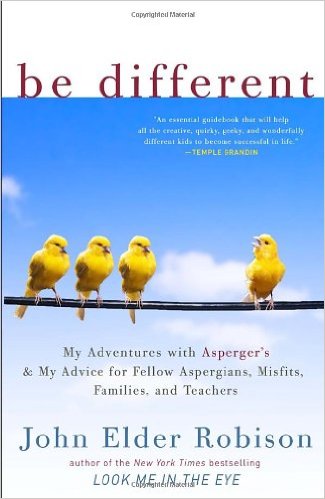I am currently in the middle of reading Steve Silberman's new book NeuroTribes and am enjoying it so much, I had the students start by watching the TED talk hosted by him called The Forgotten History of Autism. Steve has a very positive outlook on those with high functioning autism. One quote in particular that Steve shares by Hans Asperger that makes the students feel positive about themselves is, "It seems that for success in science or art a dash of autism is essential."
After watching this video, the students and I then read from the book Be Different by John Elder Robison where he gives his definition of Asperger Syndrome. He not only gives the official DSM definition but he puts his own experiences within to help explain it to those who have high functioning autism so they can understand and relate. This reading elicits so much conversation among the students. This year I was awed by the way a few of the students have shown growth over the four years they have been with me and could relate. A few of the comments were: "I am pretty sure that the first two under that section that Mr. Robison mentioned were why I was initially diagnosed." and "I used to struggle a lot more with not being able to mirror other people's facial expressions when they greeted me or passed me in the hallway. I am better at that now, but I still have to do it consciously." To know where these students started as freshmen in my classes and to hear them be able to articulate this way is empowering to me as their teacher.
We also watched a clip about a gifted young man named Jake with autism that inspired them. My goal when I present this unit to my students is to have them walk away with the feeling that they are unique, special and should be proud of what autism brings to their lives. That being said, they all have challenges that will never go away, but don't we all? They have to know what those challenges are in order to utilize their intelligence to learn strategies to overcome them. One way we we talk about this is understanding how their sensory system can't regulate itself if they have autism. They will need to learn about themselves and then how to be good self-advocates. An example in the school setting is to be aware of when they are over stimulated due to all the sounds, smells, and/or flickering lights, etc. that a classroom setting can bring and affect their academic performance.
The more we learn about ourselves, the more we can understand who we are, what we need, and how to ask for it. The more positive examples we have to show our teens with high functioning autism, the more they will feel confident and start to believe in their future goals and see success.
Welcome to the wonderful world of high functioning autism; it's pretty incredible! Make sure your teen feels how great their life is going to be by sharing with them the words of John Elder Robison, Temple Grandin, Naoki Higashida and Stephen Shore.
Happy Holidays!
Sabra Evans

